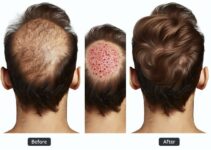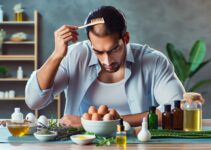As you age, you gain wisdom and experience, but along with that, you may notice your hair thinning. It's a natural part of the aging process, but that doesn't mean you have to accept it as inevitable. There are effective strategies and treatments that can help address thinning hair in older men, and understanding what works best for you is key to regaining confidence and maintaining a healthy head of hair. Whether it's making simple lifestyle changes or exploring topical treatments and dietary supplements, there are options worth considering to help combat the effects of aging on your hair.
Key Takeaways
- Hair loss in older men is influenced by genetics, hormonal changes, and environmental factors.
- Lifestyle changes such as a balanced diet, regular exercise, scalp massage, and stress reduction activities can potentially support hair growth in older men.
- Omega-3 fatty acids, biotin, and vitamin D are key nutrients that promote hair health and can be obtained through diet or supplements.
- Topical treatments like hair transplants or scalp micropigmentation can provide long-lasting and immediate results for older men experiencing thinning hair, but consultation with a dermatologist or hair specialist is crucial before opting for any treatment.
Understanding Hair Loss in Men
Understanding the causes of hair loss in men involves exploring the complex interplay of genetics, hormonal changes, and environmental factors that contribute to this common condition. Genetic factors play a significant role in male pattern baldness, with studies suggesting that it can be inherited from either the maternal or paternal side of the family. Variations in the androgen receptor gene have been associated with an increased risk of hair loss in men, highlighting the strong genetic component of this condition.
Hormonal changes, particularly the influence of dihydrotestosterone (DHT), also contribute to male hair loss. DHT is a byproduct of testosterone and can bind to receptors in the scalp, leading to the miniaturization of hair follicles and eventual hair thinning. As men age, their testosterone levels may decline while DHT levels remain constant, further exacerbating the impact of this hormone on hair follicles.
Understanding the intricacies of genetic predisposition and hormonal influences on hair loss is crucial in developing effective strategies for managing and treating this condition in men. By addressing these underlying factors, targeted interventions can be designed to help alleviate the impact of hair loss and promote healthier hair growth.
Lifestyle Changes for Hair Growth
To promote hair growth and reduce the impact of thinning hair, consider incorporating lifestyle changes such as a balanced diet and regular exercise into your daily routine. A balanced diet rich in essential nutrients like protein, vitamins (especially A, C, and E), and minerals (such as iron and zinc) can support hair health. Protein, in particular, is crucial for hair growth as hair follicles are made of mostly protein. Additionally, regular exercise can improve blood circulation, including to the scalp, which may support hair growth. Scalp massage is another simple yet potentially beneficial practice for hair growth, as it can help to stimulate the hair follicles and promote relaxation. Furthermore, stress reduction is important as high levels of stress can contribute to hair loss. Engaging in stress-reducing activities such as meditation, yoga, or spending time in nature can positively impact both your overall well-being and hair health. By making these lifestyle changes, you can potentially support the growth of thicker and healthier hair.
Key Nutrients for Hair Health
Incorporating key nutrients into your balanced diet is essential for promoting hair health and addressing thinning hair in older men. Nutritional balance plays a critical role in the maintenance of healthy hair follicles, scalp circulation, and hormonal changes that can impact hair growth. Here are three key nutrients that can help support hair health:
- Omega-3 Fatty Acids**: Found in fish, flaxseeds, and walnuts, omega-3 fatty acids are essential for nourishing hair follicles and promoting scalp circulation. They help to keep the scalp hydrated and improve hair elasticity, reducing the risk of breakage and thinning.
- Biotin: Also known as vitamin H, biotin is essential for the production of keratin, a key structural protein that makes up hair. Foods rich in biotin include eggs, nuts, and leafy greens. Incorporating biotin into your diet can help strengthen hair and promote growth.
- Vitamin D**: Adequate levels of vitamin D are crucial for maintaining healthy hair follicles. Sunlight exposure and vitamin D-rich foods such as fatty fish, cheese, and egg yolks can help support overall hair health and minimize the impact of hormonal changes on hair growth.
Topical Treatments for Thinning Hair
When addressing thinning hair, exploring topical treatments can be an effective approach to promoting hair health and potentially reversing the effects of hair loss in older men. Two popular topical treatments for hair loss are hair transplants and scalp micropigmentation.
| Topical Treatment | Cost and Effectiveness |
|---|---|
| Hair Transplants | High cost, long-lasting results |
| Scalp Micropigmentation | Moderate cost, immediate results |
Hair transplants involve transplanting hair follicles from thick hair areas to balding areas. While this method is costly, it provides long-lasting and natural-looking results. On the other hand, scalp micropigmentation is a non-invasive procedure that creates the appearance of a fuller head of hair through the application of pigments to the scalp. It is a more affordable option compared to hair transplants and offers immediate results. However, scalp micropigmentation may require touch-ups over time.
Before opting for any topical treatment, it's crucial to consult with a dermatologist or hair specialist to determine the most suitable option based on individual needs and preferences. Always consider the potential cost and effectiveness of each treatment to make an informed decision.
Dietary Supplements for Hair Regrowth
Exploring alternative approaches to promoting hair health and potentially reversing the effects of thinning hair in older men, dietary supplements have emerged as a popular consideration for supporting hair regrowth. While individual responses to dietary supplements can vary, some natural alternatives have shown promising results in promoting hair regrowth in older men. It's important to note that dietary supplements should be used in conjunction with a balanced diet and a healthy lifestyle for optimal results. Here are some dietary supplements that have shown potential based on clinical evidence:
- Saw Palmetto: This supplement may help to block the formation of DHT, a hormone that contributes to hair loss in men.
- Biotin: Also known as vitamin H, biotin is a B vitamin that is essential for hair growth. Clinical evidence suggests that biotin supplementation can help improve hair health.
- Vitamin D: Low levels of vitamin D have been associated with hair loss. Supplementation with vitamin D may help in promoting hair regrowth.
Before starting any dietary supplement regimen, it's essential to consult with a healthcare professional to ensure it's safe and appropriate for your individual health needs.
Frequently Asked Questions
Are There Any Natural Remedies or Home Treatments That Can Help With Thinning Hair in Older Men?
To address thinning hair, consider dietary supplements and nutrition. Additionally, try incorporating scalp massage with essential oils into your routine. These natural remedies may help support hair health and promote thicker, fuller hair.
Are There Any Specific Hair Care Products or Tools That Can Help Improve the Appearance of Thinning Hair?
Using hair care products and styling tools can improve the appearance of thinning hair. Natural remedies and home treatments such as essential oils, scalp massages, and a balanced diet may also help promote healthier hair growth.
What Role Does Stress Play in Hair Loss and Are There Any Effective Stress Management Techniques for Preventing Further Hair Thinning?
To prevent further hair thinning, managing stress is crucial. Incorporating relaxation techniques and making lifestyle changes can greatly impact your mental health and, consequently, your hair health. Prioritize stress management for overall well-being and hair maintenance.
Can Certain Medical Conditions or Medications Contribute to Hair Thinning and What Can Be Done to Address These Factors?
When it comes to addressing medical conditions or medications that contribute to hair thinning, it's crucial to consult a healthcare professional. They can provide tailored solutions and guidance, such as nutritional supplements or scalp massage, for older men.
Are There Any Alternative Therapies or Holistic Approaches That Have Been Successful in Promoting Hair Regrowth in Older Men?
When looking for alternative therapies to promote hair regrowth in older men, consider exploring herbal supplements, acupuncture, scalp massage, and aromatherapy. These approaches have shown potential in improving hair health and stimulating growth.


